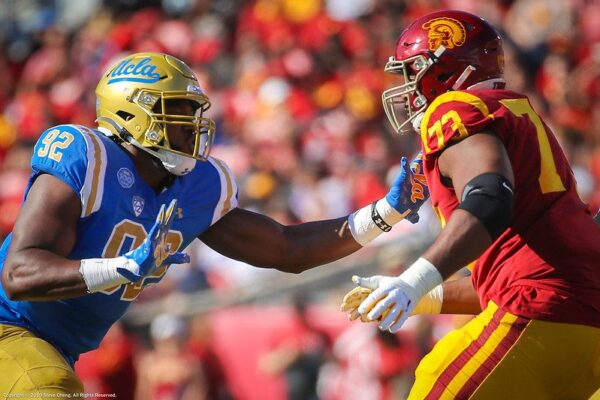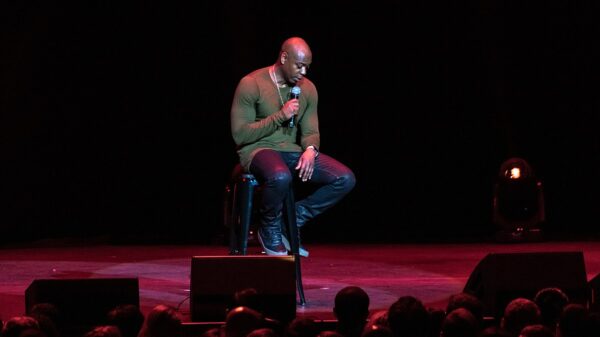The University of California Board of Regents Wednesday cleared the way for UCLA to move to the Big Ten Conference in 2024, but in exchange for its approval of the move, the board will require the university to make a multimillion-dollar donation to UC Berkeley to support that school’s athletics.
In a divided vote, the board agreed not to interfere in UCLA’s previously announced move away from the Pac-12 Conference. UCLA and USC both announced in June that they will move to the Big Ten in 2024, citing greater national exposure and dramatically higher financial revenues anticipated from media-rights deals.
The UCLA announcement, however, was met with dismay by some UC and state leaders, most notably Gov. Gavin Newsom, who lamented that he learned of the move in the media.
The Board of Regents had a series of meetings on the issue in recent months, focusing largely on its authority to potentially intervene and block UCLA’s announced conference shift. UCLA made the decision under authority delegated by the UC system president to individual campus chancellors.
Staffers for the board ultimately concluded that the board “retains the authority to take action to affirm, overturn or abstain from acting on UCLA’s decision.”
On Wednesday, the regents met for more than an hour in closed session to discuss the issue again, and when the emerged, they had developed a proposal that would allow the change in athletic conferences. But under the deal approved by the board, UCLA will have to make a “contribution” to UC Berkeley ranging from $2 million to $10 million, as determined by the board, “to enhance student-athlete support at that campus.”
The actual amount of the contribution will be recommended by the UC president, but the board will make the final determination. The amount will be based on the result of still-pending Pac-12 media-rights agreements, and “best available information on projected revenues for both campuses.”
In a statement released after the vote, UCLA Athletic Director Martin Jarmond thanked the board for its discussions on the matter.
“We’re excited to join the Big Ten Conference in 2024 and are grateful for the Board of Regents’ thoughtful engagement in this decision,” he said. “We’ve always been guided by what is best for our 25 teams and more than 700 student-athletes, and the Big Ten offers exciting new competitive opportunities on a bigger national media platform for our student-athletes to compete and showcase their talent.”
Kevin Warren, commissioner of the Big Ten, issued a statement thanking the regents for “respecting the decision” of UCLA to switch conferences.
“The landscape of collegiate athletics is evolving, and the Big Ten Conference is in a position of stability and strength with unmatched opportunities, exposure and resources for our member institutions and student- athletes,” Warren said. “With the collective goals to prioritize the health and well-being of our student-athletes and forward our academic and athletic mission under the umbrella of higher education, we will continue our methodical integration process of UCLA and USC into the Big Ten Conference.”
UCLA and USC stand to see a major boost in revenue from media rights deals in the Big Ten, which will become a coast-to-coast conference including some of the nation’s most prominent athletic programs. The conference in August announced a media rights deal worth an average of about $1 billion in annual revenue, meaning annual distributions to its member schools of up to $70 million a year.
A staff report to the Board of Regents in November noted that increased revenues generated by the move to the Big Ten will “more than offset” additional costs that will be incurred by the university, such as more travel costs for athletic teams and the need for additional academic and nutritional support. The report estimated those costs could reach more than $10 million.
In announcing the planned move in June, UCLA officials noted that the financial boost from the Big Ten will allow the university to maintain all of its athletic programs, some of which were believed to be in financial jeopardy absent a major influx of cash. The university also noted a major benefit for student-athletes, likely allowing them to obtain more lucrative name, image and likeness deals.
Speaking to the board in November, UCLA Chancellor Gene Block said the move will benefit athletes and the school.
Block said college athletics is in a “volatile” period, thanks to factors such as conference realignments, student-athlete transfers and new rules allowing athletes to profit from “name, image and likeness” contracts. He said the university also recognized that it will need to invest additional financial resources to maintain its athletics programs.
“We have a storied tradition of outstanding athletics … and we want to maintain that tradition of outstanding opportunities for our students,” he told the board.
Given the financial and career opportunities available for college athletes, “our students were asking for better national exposure,” Block said.
“They’ve been frustrated sometimes about the exposure they’re getting currently,” he said. “The national platform — being in a conference that competed nationally would give them better exposure. So I think our student-athletes overall have been excited about the opportunity to compete with the very best teams. So I think that competitive excellence was a big part of this. …
“In the end we decided this was the best move for UCLA,” he said. “I think my feeling was it was in the best interest of our student- athletes and the best interest of our institution, but not a simple decision.”
The agreement approved by the Board of Regents Wednesday included a series of requirements for UCLA, in addition to the UC Berkeley payment. The requirements include the implementation of annual plans to mitigate travel impacts on student-athletes, increased educational, mental health and nutritional support for athletes, an annual survey of athletes to ensure the adequacy of university services being offered to them, and the establishment of a $2.5 million “reserve fund” to be used if funding for athlete services falls short in any area.







